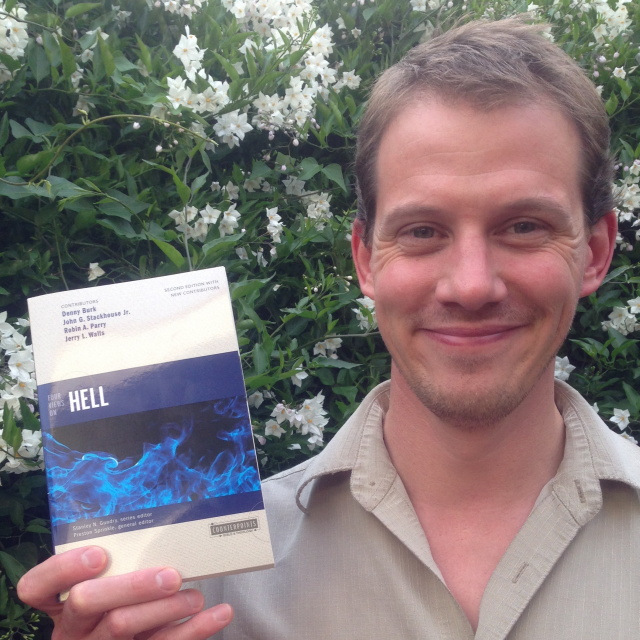
I’ll have to pause my current blog series because Four Views on Hell: Second Edition has arrived! This is the latest book in Zondervan’s1 Counterpoints―a series that allows 3-5 prominent scholars to each present their view on an important biblical and theological issue, and then respond to each of the others. Thus, in one book, a reader can get a good overview of the topic and see where the points of difference are. Because of this, I suspect the book will turn out to be one of the most significant books on the topic of Hell for many years to come. My aim is to post about the book as I read through it.

The general editor of this book, Preston Sprinkle, wrote the Introduction. He starts by acknowledging that Christianity’s doctrine of Hell has sometimes been poorly articulated and misused. Also, that even within evangelical Protestantism there has been a wide range of views. The examples he gives are Karl Barth, C. S. Lewis, John Stott, and N. T. Wright. He says that in the last 20 years there has been an increasing amount of discussion of the topic (I’ve observed this too). He rightly notes that this isn’t because people are becoming “wishy-washy” but quite the opposite, it’s because people are re-examining Scripture. I think this is partly due to the Internet exposing us to many great Christian thinkers, past and present, across the entire Church, not just our local denomination. In the same vein, he mentions that dialogue between Protestants and Catholics is now common. Another reason for re-examining Scripture is that Early Church history, councils and creeds are more accessible, meaning we can see for ourselves that all of the views on Hell in this book are actually orthodox2.
If you hold onto your view too tightly, unwilling to reexamine it in light of Scripture, then you are placing your traditions and presuppositions on a higher pedestal than Scripture itself. If the view you have always believed is indeed Scriptural, then there’s nothing to fear by considering and wrestling with other views. If Scripture is clear, then such clarity will be manifest.
Preston Sprinkle, p14
I loved that he emphasised “ecclesia temper reformanda est, or ‘the church is (reformed and) always reforming’”3, which was the inspiration behind this blog (see my first post). I agree with him that we regularly need to review our views, otherwise:
It’s common, perhaps likely, that unexamined beliefs become detached from their scriptural roots over time [and acquire “unbiblical baggage” p11] … We believe particular doctrines, but can’t always defend them biblically.
Preston Sprinkle, p15
He briefly introduces each contributor4 and their view:
- Denny Burk is “a Professor of Biblical Studies and the director of the Center for Gospel and Culture at Boyce College”. His view is Eternal Conscious Torment, and is based on passages such as Matt 25:46.
- John Stackhouse is “the Samuel J. Mikolaski Professor of Religious Studies and Dean of Faculty Development at Crandall University”. His view is “terminal punishment” (aka Annihilationism or Conditionalism), and is based on passages such as Matt 10:28.
- Robin Parry has “a PhD [in OT theology] from the University of Gloucestershire (UK) and serves as the commissioning editor for Wipf and Stock Publishers”. His view is Christian [Evangelical] Universalism (aka Universal Reconciliation), and is based on passages such as Rom 5:18. Sprinkle helpfully points out that this is not “anything goes, all roads lead to heaven” pluralism!
- Jerry Walls is “Professor of Philosophy at Houston Baptist University”. His view assumes Eternal Conscious Torment but unlike Burk, he argues here for a type of purgatory where sanctification of believers and sometimes repentance of some (but not all) people who hadn’t believed in this life, can occur (similar to C. S. Lewis?), based on passages such as 1Cor 3:10-15. Sprinkle explains that this does not replace Christ’s atonement.
All of them have also authored multiple books and publications. I appreciated that he repeatedly points out all the contributors to this book:
- are committed Christians
- believe in the inspiration and authority of Scripture
- affirm the existence of Hell (despite differing on the nature of it)
- base their view primarily on Scripture and theological reasoning rather than tradition, emotion or sentimentality
As Christians, we should seek to understand before we refute, and if we refute, we must do so based on compelling biblical evidence and not out of fear or presupposition.
Preston Sprinkle, p15
1. Publisher of the well known NIV translation.
2. He mentions this here in relation to Annihilationism but elsewhere I’ve seen him say this about Evangelical Universalism too.
3. p15
4. All quotes in this paragraph are from p13.

3 thoughts on “Sprinkle’s Introduction to “Four Views on Hell: Second Edition””